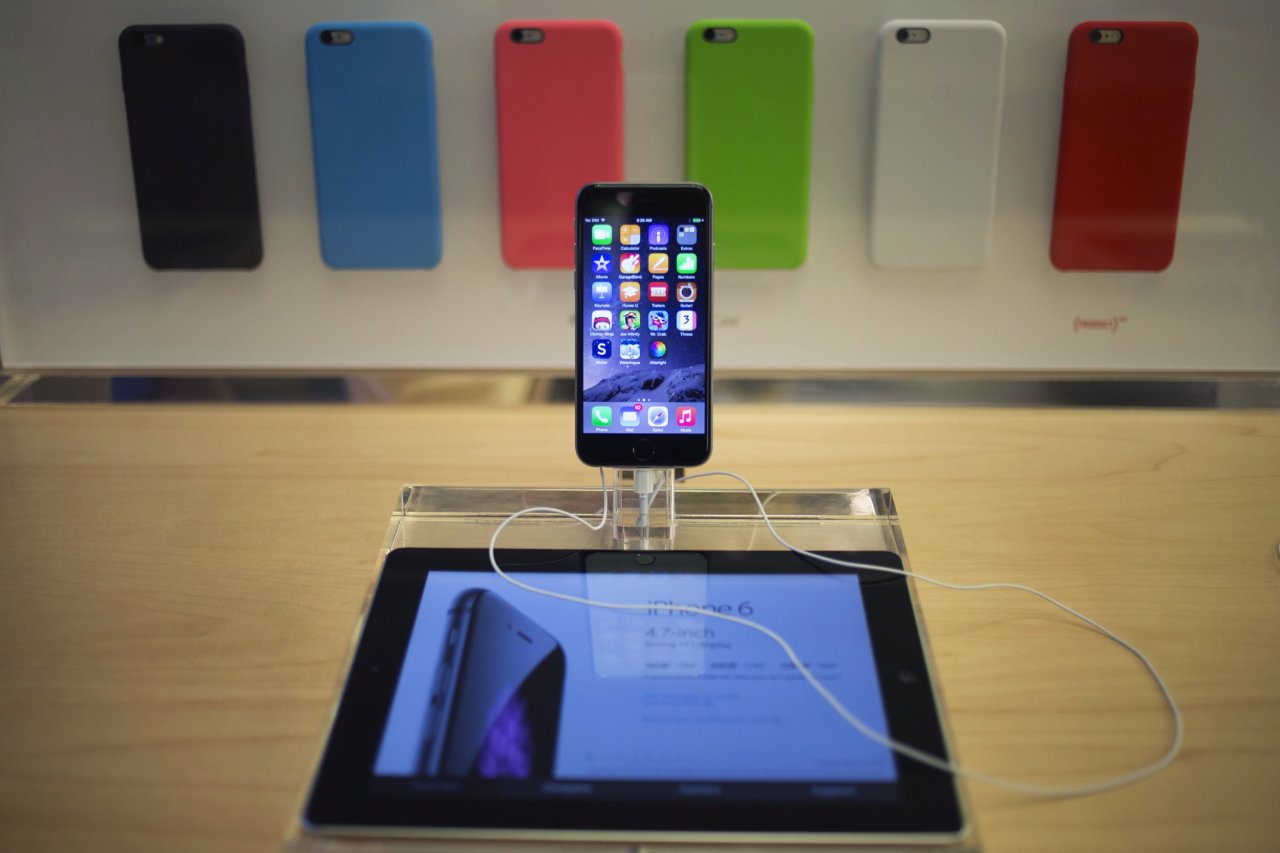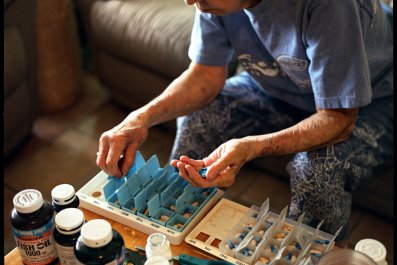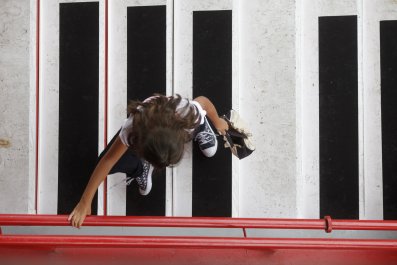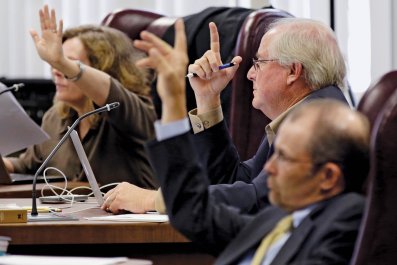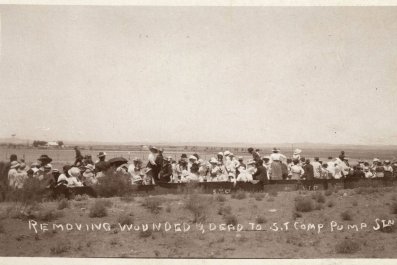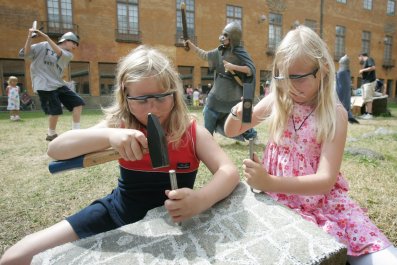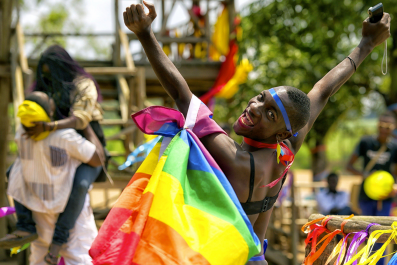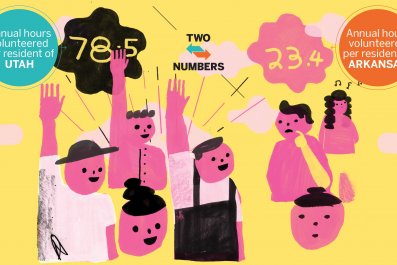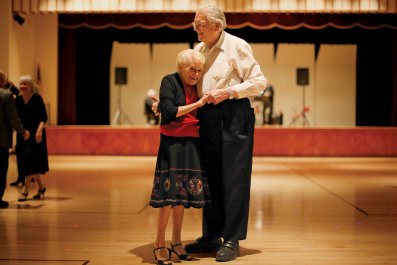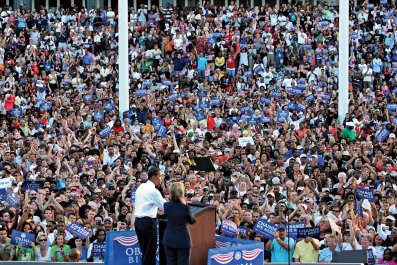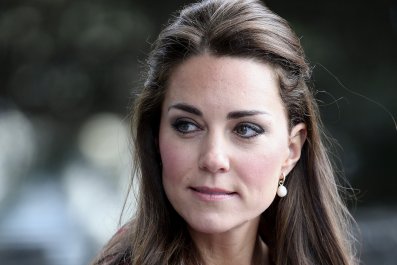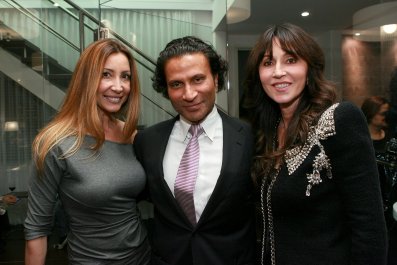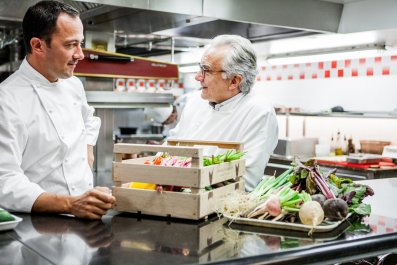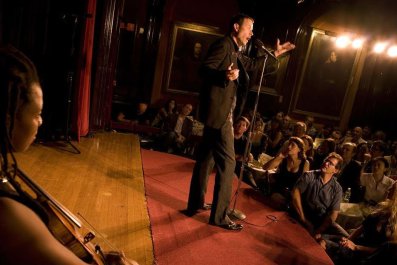Perhaps future historians will look back at this moment in the 21st century as the beginning of the singularity, when humans began to merge with their electronic devices and the artificial intelligence contained within them. Or maybe this will mark the moment when people collectively decided to put the damn things down, or at least give them a rest.
Dan Hoyle is betting on the latter. In his one-man show Each and Every Thing, the 34-year-old actor and playwright confronts society's addiction to smartphones and the cost in human connectivity—while completely understanding their appeal. As a guy in his show says after undergoing Digital Detox, "Reality is awkward."
"There's a reason screens are so prevalent," Hoyle says. "It's less awkward. But once people know the rewards of getting out of your comfort zone and letting the moment linger longer, I think more and more people are going to be attracted to that. Analog experiences, for want of a better word—live, un-screened experiences—are going to be revalued."
Hoyle and I are having coffee at a place called the Revolution Cafe in San Francisco's Mission District, just a few blocks from the small Marsh theater, where his show's run has just been extended for a third time. (Each and Every Thing will go to Joe's Pub, part of New York's Public Theater, on October 12 and to Columbia University on October 16.) From its name to the winos who stumble in looking for a free cup of joe, the Revolution seems a throwback to the old Mission—not the gentrification ground zero that countless magazine articles have depicted in stereotype, where tech billionaires light e-cigarettes with their bitcoins as they evict Mexican muralists and boho poets from their garrets. The real story is always more interesting.
"I have my own little brand I call 'journalistic theater,'" says Hoyle, trying to describe the method behind the 75-minute monologue, in which he channels black street kids, Aryan Brotherhood converts and Indian professors. "I'm still responding to the needs of theater, yet rooted in the journalistic practice of observing people."
Each and Every Thing began with a commission from the Pew Theater Initiative to do something about the decline of newspapers. (Hoyle's previous one-man shows, The Real Americans and Tings Dey Happen, had received a good deal of critical attention and comparisons to such pioneering solo performers as Danny Hoch and Anna Deavere Smith.) He was supposed to go around the country and interview journalists but quickly found that "journalists are deflective people" and perhaps not the stuff of a great evening at the theater.
Besides, the journalism angle "was just my in to something [bigger]," which was "the digitization of how we experience the whole world. For me the entry point had been reading the daily newspaper in the morning as opposed to going down the rabbit hole of clicks.… I realized that actually this is happening to every aspect of our life; there's a much bigger story here."
All that's left of the Pew mission in his show is a rap song about papers ("Now you're gone, and it's like everybody has their own facts"), but it dovetails nicely with his discovery, after living in Africa for a year, that all of his friends had become hooked on cellphones and social media. "I'm trying to face my problems, not Facebook my problems," he laments in the show. Which is when Pratim, a friend from Calcutta, says, "Why don't you go to India? It's like the Internet in real life. You can have random chats with people every day."
Hoyle had wanted to include India in his research for Pew—the world's largest democracy has a thriving newspaper business and, in Calcutta, a coffeehouse scene in which men sit around and talk about the news of the day (and everything else) for hours. "I did all this research on newspapers," he says. "They talked about these coffeehouses in Paris and London and say, 'That was the Internet of the 18th century, a place where people would gather and ideas would zip around the room, rumors would fly.' I sort of found it again."
The elastic-faced performer came to his craft honestly; his father, Geoff Hoyle, was a performer with SF's Pickle Family Circus and Cirque Du Soleil before originating the role of Zazu in The Lion King on Broadway. But Dan was not drawn to fantasy. "I was interested in creating theater that was based on what was happening in the world."
His first performance piece was a short called "Stuck Up," a local term other players used when they stole the ball from him. "I played a lot of pickup basketball at this court in Chicago," where Hoyle was a student at Northwestern. "I was the only white dude, so it was all about being that guy. I first got called Dan Aykroyd, then I graduated to Wayne Gretzky."
Hoyle's interest in other people and other cultures took him to Nigeria, where he spent a lot of time in a village that was a hotbed of militant activity, mostly related to oil and rival gang activities. It was a Fulbright scholarship that brought him there, and the U.S. government invited him back to perform the show that came out of it, Tings Dey Happen, in front of some of the very people who had been his sources. "I do the policeman stopping the cars and asking for dash, a bribe, and they were like, 'What the heck! This white dude from California playing Nigerians for Nigerians, sponsored by Americans?' That was the peak artistic experience of my life, so far."
Today Hoyle calls New York City home (his wife, Lyra, teaches art at a school in the Bronx). He is aware that people his age (and younger) are not too likely to see what he's doing onstage. (His father had just performed in the same space in a show called Geezer.) "I've had a lot of young people come and are like, 'Wow! That was good. The last time I went to the theater, they were speaking in funny accents and dressed in weird costumes, and it was a Sunday afternoon and my friends were skateboarding and I wanted to end myself—but that was actually cool!'"
And you can't see Hoyle on HBO Go yet (though he's not opposed to the idea). "When I was going to final rehearsals, I wrote an email to a colleague saying, 'It's us against Netflix streaming, from here to eternity,'" he recalled. "And I don't know if I like our odds necessarily."



